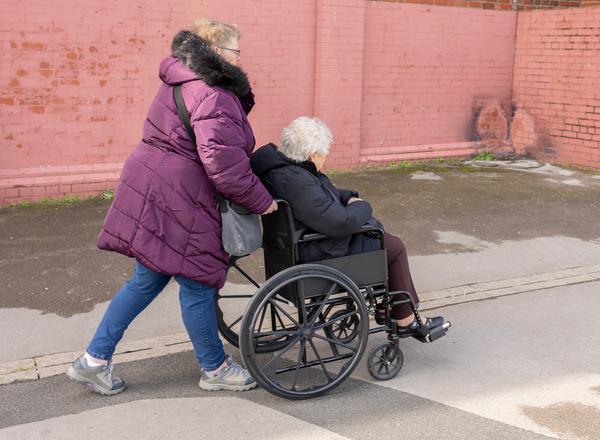
A helping hand for the helpers - a plan to recognise Scotland's unpaid carers
Article
A Minimum Income Guarantee pilot would empower carers to take control of their own lives and regain some independence from a state that has become overly reliant on their unpaid labour and goodwill to function.
During the height of the Covid-19 pandemic in 2020, it became glaringly obvious just how much our society depends on workers on the frontline of society– from nurses and doctors to sanitation workers and bus drivers. It was also during the pandemic that another class of frontline workers went comparatively unnoticed even as their numbers swelled: Scotland’s unpaid carers.
There are few acts as selfless in life as dedicating time and energy to the care of others. Often seen as the ultimate expression of love for and commitment to a family member, partner, friend or neighbour, many provide unpaid care without even considering themselves as unpaid carers. Yet their role in sustaining our society is severely underpriced.
Scotland’s unpaid carers save the state £15.9 billion each year, whether they spare a few hours a week to prepare meals or they provide around-the-clock care, all day every day. What’s more is that with an increasingly ageing population, the number of unpaid carers in Scotland is only set to grow, and by extension our dependence on their goodwill. The burden on the state to close the equivalent gap of care would be insurmountable.
The selfless efforts they put in the care of a loved one come at a great cost to unpaid carers themselves.
Unpaid carers are 56 per cent more likely to be in poverty and 60 per cent more likely to be in deep poverty than those without caring responsibilities, all the while experiencing worse health outcomes than non-carers. Very often, their earnings and career prospects are severely curtailed as a consequence of time spent providing care. The long-term impact on unpaid carers lasts far beyond the end of the period of caring, with ramifications for delayed career progression, skills development and pension contributions.
Despite their saving Scotland vast sums on the national ledger, and the visibility of carers increasing in national discourse (the First Minister himself is an unpaid carer), the infrastructure of support for carers is not commensurate to their sacrifices of time, money and energy. Carer’s Allowance has changed little in its 50-year existence and remains the lowest income replacement benefit of its kind at £81.90 per week for a minimum of 35 hours of care. Meanwhile, among the carers who receive state support through Universal Credit, more than half live in poverty.
Often seen as the ultimate expression of love for and commitment to a family member, partner, friend or neighbour, many provide unpaid care without even considering themselves as unpaid carers.
However, some positive developments have emerged with the devolution of carer benefits. These include the introduction of a Scottish Carer’s Allowance Supplement in 2018, a benefit paid twice yearly at a value of £288.60, and the extension of the new Carer Support Payment to those in full-time education in 2023. Additionally, in Scotland, unlike the rest of the UK, younger carers aged 16-18 are able to access a Young Carer Grant worth £383.75 per annum.
Beyond partially compensating unpaid carers for their labour, the state should work to give carers back their independence, so that they can enhance their quality of living both as individuals and carers. One way to achieve this—and to enhance financial security—is by creating pathways to employment through improved flexible working, standardised emergency leave, and efforts to prevent discrimination against carers in hiring.
A Minimum Income Guarantee pilot
In response, we at IPPR Scotland, and our partners at Carers Scotland, have devised a plan of action for how best to remedy the inequities facing unpaid carers. This week, along with Carers Scotland, we launched a report proposing the Scottish Government pilot a Minimum Income Guarantee (MIG) for unpaid carers. A MIG is an assurance that no one will fall below a set income level which would allow them to live a dignified life. This guarantee is facilitated through enhanced access to fair and flexible employment, targeted payments, and increased access to other free or discounted services to be provided or subsidised by the state.
Under this pilot, a certain number of unpaid carers in Scotland who care for someone more than 20 hours a week and receive Universal Credit or Pension Credit would benefit from an additional income supplement alongside a concerted effort to maximise income from existing eligible benefits. We believe that by maximising the income of unpaid carers and bringing them up to a minimum income standard, they will have greater flexibility and opportunity to increase their own independence. This means, carers would have the choice to reduce the demand of care on themselves with greater time to pursue a career. Alternatively, they might choose to continue caring at the same rate while using the additional income to subsidise and safeguard their own personal spending power distinct from the financial costs of care.
A Minimum Income Guarantee pilot would empower carers to take control of their own lives and regain some independence from a state that has become overly reliant on their unpaid labour and goodwill to function. It would also serve to urgently redress the particular injustices faced by many unpaid carers including poverty, poor health and hampered life opportunities. This is a necessary step to recognise the worth of unpaid carers. Building a more equitable system of support for them is an investment, not simply because it is right, fair and just, but because by supporting carers, we strengthen families, communities, and ultimately, our entire society.